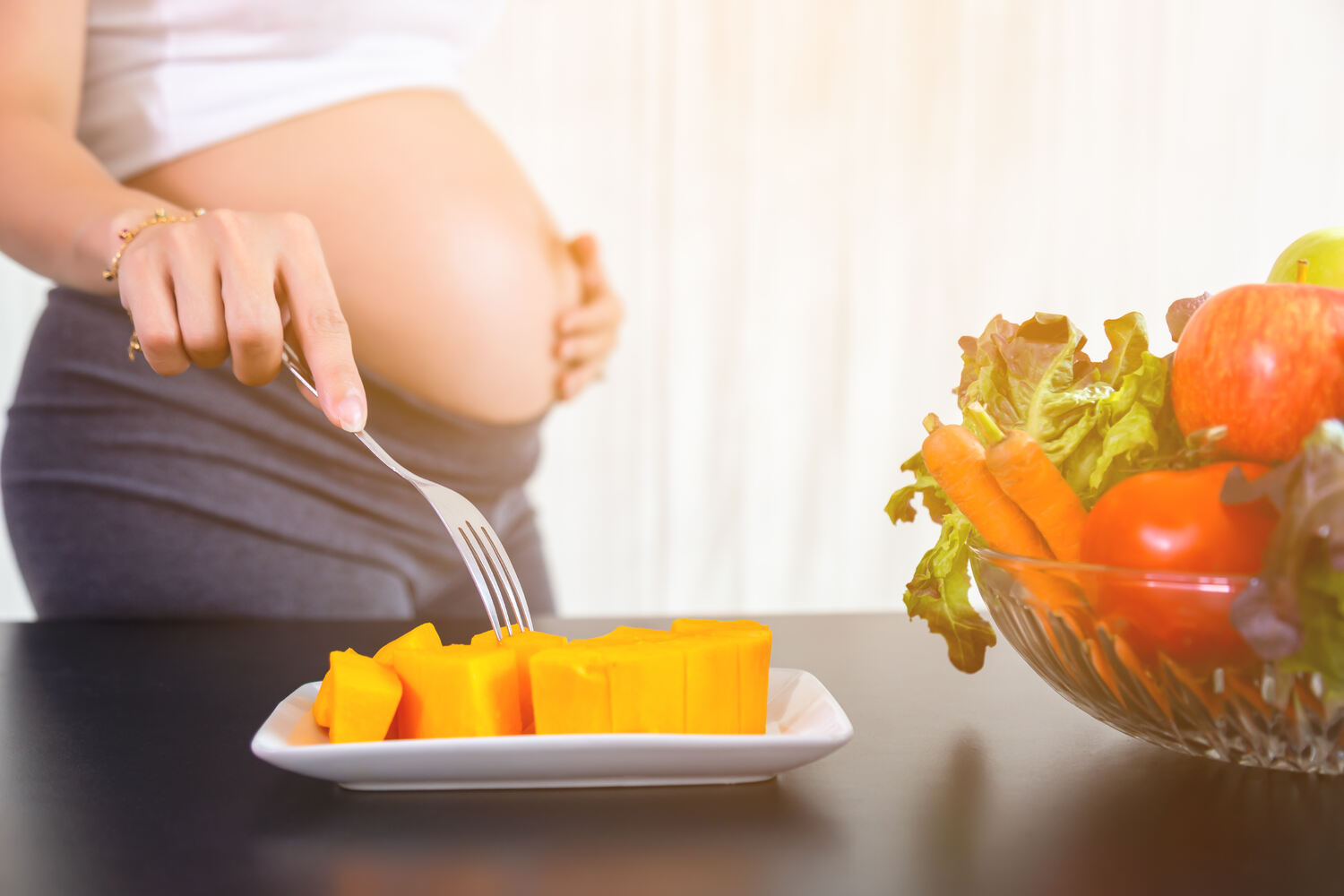
Pregnancy is a beautiful and overwhelming journey. Towards the end of this period, expected mothers look forward to the baby’s arrival and so they find natural ways to induce labor. But, are you aware of the foods that induce labor naturally? Yes, It’s true! There are certain nutrients present in various foods and herbs that help induce labor.
There are certain food items coming from plant and animal sources that influence pregnancy and delivery. Some foods influence the health of the mother and unborn child by supplying the daily needed vital nutrients while there are other food items that are capable of stimulating the contractions and thus, inducing the labor. Care should be taken before trying these natural ways, make sure to consult a gynecologist.
In This Article
- Can Certain Foods Really Induce Labor?
- Why Should Labor Be Induced Naturally?
- Foods That Can Help To Induce Labor Fast
- Should You Try Inducing Labor Yourself With Certain Foods?
- Foods To Avoid Before Labor
- When To Call The Doctor
- FAQs
Can Certain Foods Really Induce Labor?
The process of labor and delivery is a natural and unique experience for every woman. Expectants seek natural and safe ways to induce labor. Specific foods on consumption are believed to trigger labor and delivery, though more scientific evidence is required to confirm their effectiveness. Many individuals inquire about different methods to induce labor naturally by softening the cervix with foods containing chemical components like enzymes. These contractions are desired to facilitate the baby’s exit from the mother’s womb.
Why Should Labor Be Induced Naturally?

Towards the final weeks of gestation, all pregnant women look forward to the due date. However, approaching or going past the due date without any significant sign of labor will leave them uncomfortable and impatient. This will urge them to think of something to make the labor faster.
The easy way is to depend on medical interventions (1). There are several natural methods that they can try at home to induce or accelerate labor. One of the ways to hasten labor is by eating certain foods. No scientific proof of food-induced labor. But there is some “circumstantial evidence” of the ability of some food items to induce labor. Here are some of the foods that can accelerate the labor:
Foods That Can Help Induce Labor Fast
In order to shorten the labor period, you are receiving advice or ways to induce labor, but foods that induce labor are always highly recommended. Though some foods have negative effects than others, keeping patience during gestation and enduring the experience positively is the key to successful delivery. Below them are common foods known to induce labor fast.
1. Pineapple

The enzyme Bromelain present in pineapple is known for softening and stimulating the cervix and smooth muscles to bring on labor. Eating a large amount of fresh pineapple is essential to bring out the result. (2) Therefore, the chances of diarrhea are higher than those of labor (oops). Read more on pineapple during pregnancy.
2. Papaya
The green papaya (unripe) is used to induce labor. Papain, the enzyme present in latex of this vegetable, helps trigger uterine contractions. This latex improves prostaglandin and oxytocin functioning while initiating uterine contractions during labor. The concentration of the latex reduces as the papaya ripens. Hence, eating a ripe papaya has no such effect on generating contractions. (3) Find more on papaya during pregnancy
3. Chinese Food

Sumptuous foods coming from tempting Chinese cuisine are magical foods to induce labor. The spice, specifically peppers, is the main reason behind the stimulation of the contractions
4. Garlic
Eating garlic moderately stimulates bowel movements and helps your body get ready for labor quickly. Additionally, the volatile compounds present in this spice reduce platelet aggregation and oxidative stress, which is an important concern when inducing labor naturally. (4)
5. Castor Oil

For centuries, castor oil has been considered a labor inducer as it stimulates contractions. It is taken towards the last week of gestation. One major drawback is that it can make you feel nauseous and you may vomit or even cause diarrhea (so, hydration is very important). Otherwise, it neither harms you nor your child (5)
6. Balsamic Vinegar
Taking shots of balsamic vinegar is popular among women to induce labor naturally. Some women prefer balsamic vinegar over castor oil to induce labor because Balsamic vinegar tastes far better than castor oil and also assists in the breakdown of sugars. Also, it helps to overcome gastric distress, which is likely seen when taking castor oil.
7. Raspberry Leaf tea

Raspberry leaf tea is considered uterotonic because it strengthens and tones the uterus (6) thereby preventing postdate pregnancies. Also, ingesting raspberry leaves shortens the second stage of labor and minimizes the chances of an assisted delivery. Moreover, drinking raspberry leaf tea is safe for you and your baby, though more research is needed to confirm its safety and efficiency.
8. Spicy Food
Whether an Indian spicy curry or a Mexican spicy dish, spicy food is often used as a labor inducer. They stimulate the release of prostaglandins and initiate uterine contractions. Capsaicin present in peppers releases neuropeptides, enhances cervical ripening, and also brings out bowel movements to initiate labor pain. Eating hot food will stimulate bowel movements, thereby, prompting the womb to get into action. Again, care should be taken to eat in moderation; otherwise, it will cause gastric distress and further complications. Do hot foods induce labor?
9. Eggplant Parmesan

Eating eggplant parmesan (an Italian dish made with shallow or deep-fried eggplant layered with cheese and tomato sauce). The recipe is available on the internet and greatly helps to start labor. The seasoning of basil and oregano and, of course, the star ingredient of this dish, eggplant, influences the onset of labor. Care should be taken to eat in moderation to avoid premature delivery or stillbirths.
10. Basil And Oregano
These herbs act as natural stimulants, thereby helping in the release of prostaglandin and thereby inducing uterine contractions. The oil of these herbs can also be also helpful in inducing labor but only after obtaining a doctor’s consent.
11. Licorice

The root often used as a flavoring agent in candies, medicines, etc. contains a compound called glycyrrhizin that increases the production of prostaglandin and promotes uterine contractions. However, it is not recommended to consume it in larger portions during pregnancy as it triggers preterm birth, increases cramps and blood pressure, or even causes diarrhea. (7) The root, especially the black one, acts as an aid to induce labor when your due date is passed. Eating licorice candy won’t help greatly, as it is merely sugar and artificial flavors.
12. Cumin Tea
Cumin tea, which is used in treating digestive issues and bloating, is also used in inducing labor by improving the metabolic rate, stimulating the uterus, and positively promoting contractions.
13. Dates

Regarded as one of the healthy snacking options, Dates provides oxytocin that plays a crucial role in labor induction. Studies confirm that consuming 6 dates in the last 4 weeks of pregnancy softens the cervix and promotes smooth labor. Additionally, dates are responsible for providing energy and essential nutrients like iron for the mother. (8)
14. Sesame Seeds
Sesame seeds are responsible for stimulating uterine muscles and their contractions. However, it is better to eat these seeds or the laddoos towards the end of your gestation or when you feel like inducing labor yourself.
15. Fenugreek
Fenugreek seeds aka Methi dana stimulates uterine contractions leading to premature delivery. These seeds are safely consumed to induce labor as well as ease the pain during delivery. (9)
Should You Try Inducing Labor Yourself With Certain Foods?

The last days of gestation are quite challenging, frustrating, and not soothing. Hence, it is important to be safe, keep yourself healthy, and get proper rest. The feelings experienced during this time are quite different from those experienced when experiencing gastrointestinal distress. Despite the several myths surrounding how to induce labor naturally, it is important to consult with your gynecologist for better information on how to initiate labor safely once you reach your due date. Always remember to be kind and patient during this time, because you deserve the best.
Foods To Avoid Before Labor
During the labor process, it is recommended to steer clear of certain foods, such as heavy portions of meat, excessively spicy rich food, and, of course, heavy meals. Even alcoholic beverages and excessively acidic foods should be avoided before labor, as they are the leading cause of birth defects and miscarriage.
When To Call The Doctor

It is quite understandable that you are excited to welcome your baby and find safe ways to get labor going, especially when you are at the end of your gestation rope. Keep your healthcare expert, like your gynecologist, in the loop and discuss suitable ways to induce labor based on your health records. Always remember not to try to induce labor before 40 weeks, and talk to your doctor before taking supplements, especially the herbal ones. Also, while trying these methods, if you experience extreme low back pain, cramps in the abdominopelvic area, or bleeding, it is better to seek medical attention without delay.
There are many traditional natural ways to induce labor. Certain foods are depicted as harmless and safe by many as labor-inducing ones but limited resources show their efficiency. It is, however, better to consult a healthcare professional to go over it to avoid any complications.
FAQ’s
1. What Can I Eat For Quick Delivery?
Including dates and herbal tea shows oxytocic effects and stimulates uterine contractions to promote easy delivery. However, care should be taken for predisposing complications, if any, during gestation.
2. What Is The Fastest Way To Induce Labor Naturally?
Eating dates in the final weeks of gestation increases ripening and dilation of the cervix naturally and lessens the need for oxytocin. Eating 6 dates continuously for 4 weeks before labor reduces the need for induction and makes the delivery process smoother.
3. What Is The Quickest Way To Go Into Labor?
Sexual intercourse with nipple stimulation is the quickest way to go into labor. It helps to release prostaglandin hormones and eventually jumpstart uterine contractions. Ask the doctor to find out more details before trying.
4. How Can I Open My Cervix Naturally?
There are several approaches and methods to open the cervix naturally or induce labor naturally. The use of herbal extracts, hot baths, castor oil, and regular physical activity are helpful. Sexual intercourse and mechanisms of the oxytocic activity of papaya proteinase enzymes present in pineapple are also recommended. Ask the doctor before going for this.
References:
- Sexual intercourse for cervical ripening and induction of labor – [https://www.ncbi.nlm.nih.gov/pmc/articles/PMC7017007/]
- Investigating the effect of edible pineapple on the ripening of the cervix and the onset of labor- [https://www.researchsquare.com/article/rs-2915312/v1]
- Mechanisms of the Oxytocic Activity of Papaya Proteinases – [https://www.tandfonline.com/doi/full/10.1080/13880200490902608]
- The Effect of Garlic Tablet for Preventing Preterm Labor: A Randomized Clinical Trial – [https://brieflands.com/articles/jjnpp-137008]
- Castor oil for induction of labor in post-date pregnancies: A randomized controlled trial – [https://www.sciencedirect.com/science/article/abs/pii/S1871519217300033]
- Biophysical effects, safety and efficacy of raspberry leaf use in pregnancy: a systematic integrative review – [https://www.ncbi.nlm.nih.gov/pmc/articles/PMC7871383/]
- Birth Outcome in Relation to Licorice Consumption during Pregnancy – [https://academic.oup.com/aje/article/153/11/1085/64666#google_vignette]
- Date Fruit Consumption (Phoenix Dactylifera L) Facilitates Labor – [https://ukinstitute.org/journals/1/makein/article/view/180
- Dangerous Spices in Pregnancy – [https://www.researchgate.net/publication/298424611]

